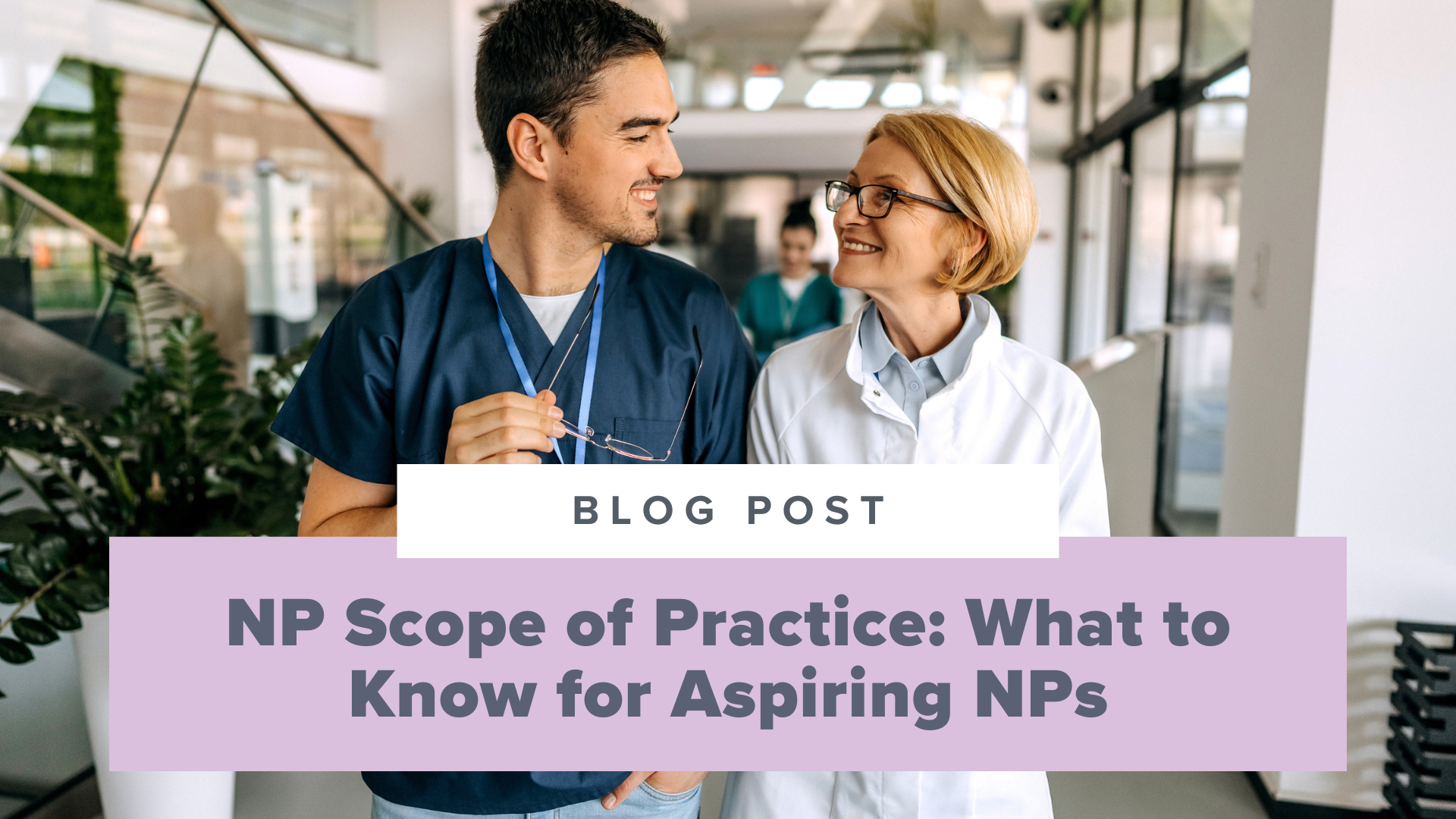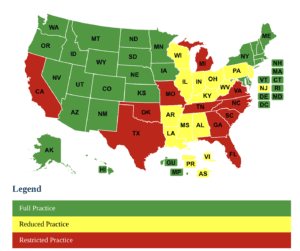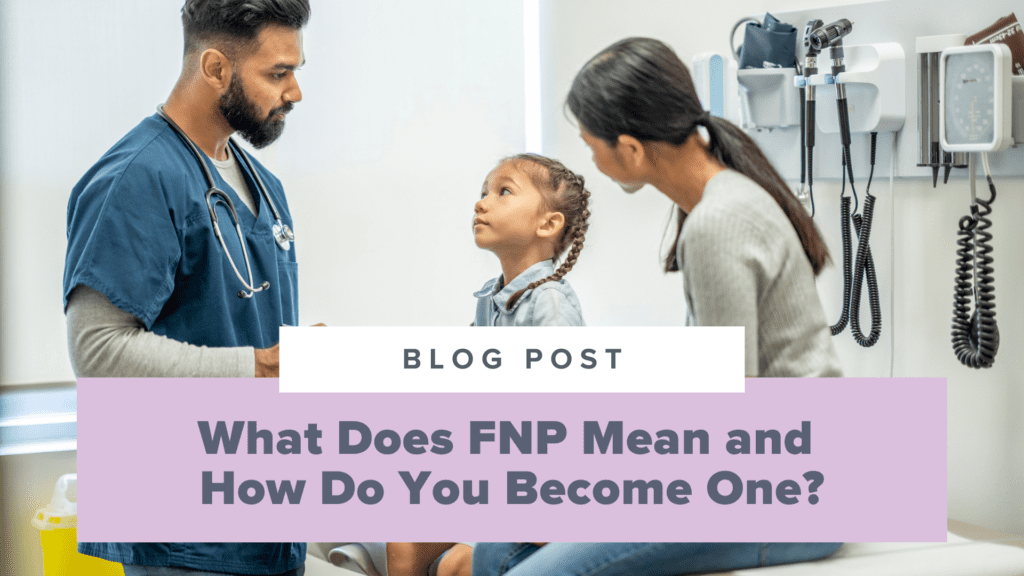NP Scope of Practice: What to Know for Aspiring NPs
- by
- Sep 18, 2024
- Articles

According to Google, some of the most common questions people have about the NP scope of practice are the following:
“Can nurse practitioners do surgery?”
“Can a nurse practitioner do a pap smear?”
“What’s the difference between a psychiatric nurse practitioner vs. psychiatrist?”
“Is a midwife a nurse practitioner?”
If you’re a nursing student wondering the same thing, the world of nurse practitioners might be calling! ☎️ This career path combines the compassion of nursing with the autonomy of advanced practice, offering a fulfilling and impactful role in healthcare. In this post, we’ll explore what being an NP entails, the scope of their practice, and answer FAQs from nursing students like you!
Understanding the Nurse Practitioner Role
What is a Nurse Practitioner?
Nurse practitioners are advanced practice registered nurses (APRNs) who provide primary and specialty healthcare services. A nurse practitioner’s responsibilities go beyond those of a registered nurse (RN), allowing them to diagnose illnesses, prescribe medications, and manage patient care. NPs often work in collaboration with physicians, but many operate independently, especially in states where they have full practice authority.
NPs can specialize in various fields, such as family practice, pediatrics, geriatrics, or women’s health. This specialization allows them to deliver targeted care tailored to specific patient populations. With an emphasis on holistic care and patient education, NPs play a crucial role in enhancing patient outcomes and promoting wellness.
The History and Evolution of Nurse Practitioners
The concept of nurse practitioners emerged in the mid-20th century, a response to the increasing demand for primary care providers. The first NP program was established in 1965 at the University of Colorado, founded by Dr. Loretta Ford and Dr. Henry Silver. This initiative aimed to address healthcare shortages and improve access to care, particularly in underserved areas.
Since then, the NP profession has grown significantly, with more than 385,000 NPs practicing across the United States today. The role has evolved to include a wide range of specialties and practice settings, reflecting the growing need for skilled healthcare providers who can deliver comprehensive and cost-effective care.
Why Pursue a Career as a Nurse Practitioner?
Becoming a nurse practitioner offers numerous benefits, both personally and professionally. NPs enjoy a high level of autonomy and flexibility in their practice, allowing them to tailor their careers to their interests and goals. The demand for NPs continues to rise, providing job security and opportunities for career advancement.
In addition to professional benefits, NPs often find great satisfaction in making a tangible difference in their patients’ lives. By building long-term relationships and focusing on preventative care, NPs empower patients to take charge of their health and well-being.
Exploring the NP Scope of Practice
What Are NPs Allowed to Do?
The NP scope of practice is broad, and can vary depending on their specialization and state regulations. In general, NPs can:
– Diagnose and treat acute and chronic illnesses
– Prescribe medications and therapies
– Order and interpret diagnostic tests
– Provide patient education and counseling
– Perform routine procedures, such as suturing or incision and drainage of abscesses
In states with full practice authority, NPs can perform these tasks independently without physician oversight. However, in states with reduced or restricted practice, NPs may need to collaborate with or be supervised by a physician.
Here’s a full map of full vs. reduced vs. restricted practice:
Image Credit: AANP
What’s the Difference Between the NP Scope of Practice vs. Physicians?
While both NPs and physicians provide patient care, their training and scope of practice differ significantly. Physicians undergo extensive medical training, including medical school and residency, which equips them with a deep understanding of complex medical conditions and treatments.
NPs, on the other hand, mainly focus on primary and preventative care, emphasizing patient education and holistic health management. Their training includes advanced nursing education and clinical experience, allowing them to deliver high-quality care within their scope of practice.
In practice, NPs and physicians often collaborate to provide comprehensive care, with NPs handling routine and preventative care while physicians manage more complex cases. This teamwork enhances patient outcomes and ensures that patients receive the right level of care.
Can Nurse Practitioners Perform Surgery?
Nurse practitioners are not licensed to perform major surgical procedures. However, they can assist in surgeries and perform minor surgical tasks, such as wound suturing or biopsy sample collection. NPs working in surgical settings often collaborate with surgeons, providing pre- and post-operative care and ensuring continuity of care for patients.
For nursing students interested in surgical roles, pursuing a career as a surgical nurse or seeking additional certifications in perioperative care can offer opportunities to work closely with surgical teams.
Can a Nurse Practitioner Do a Pap Smear?
Yes, nurse practitioners are qualified to perform pap smears as part of routine gynecological care. Pap smears are essential for detecting cervical cancer and other abnormalities, and NPs are trained to conduct these screenings accurately and comfortably.
In addition to pap smears, NPs specializing in women’s health can provide comprehensive gynecological care, including breast exams, contraceptive counseling, and menopause management.
Is a Midwife a Nurse Practitioner?
A midwife is not automatically a nurse practitioner, but there are advanced practice nurses who specialize in midwifery. Certified nurse-midwives (CNMs) focus on providing care to patients during pregnancy, childbirth, and the postpartum period.
CNMs are trained to manage normal pregnancies and deliveries, as well as provide gynecological and reproductive health services. They work collaboratively with obstetricians and other healthcare providers to ensure safe and positive birth experiences for parents and babies.
Can Women’s Health NPs Deliver Babies?
Women’s health nurse practitioners (WHNPs) are not typically licensed to deliver babies. However, they play a vital role in prenatal and postpartum care, supporting patients throughout their pregnancy journeys.
WHNPs provide comprehensive care, including prenatal check-ups, nutritional counseling, and postpartum support. They collaborate with midwives and obstetricians to ensure seamless care for expectant parents and their newborns.
What’s the Difference Between a Psychiatric Nurse Practitioner vs Psychiatrist?
Psychiatrists are medical doctors who specialize in mental health, requiring a medical degree followed by a residency in psychiatry. This extensive training enables them to diagnose and treat complex psychiatric conditions and prescribe medications.
On the other hand, psychiatric mental health nurse practitioners (PMHNPs) are advanced practice registered nurses with specialized training in mental health care. They have advanced nursing degrees and clinical experience in psychiatry, allowing them to provide a wide range of services, including assessment, diagnosis, therapy, and medication management.
While PMHNPs focus on holistic, patient-centered care, psychiatrists handle more intricate psychiatric cases. In practice, PNPs and psychiatrists often work together to offer comprehensive mental health services, each bringing their own strengths to the care team. This collaboration ensures that patients receive compassionate and effective support on their journey to mental wellness.
Conclusion
For nursing students contemplating their future career paths, becoming a nurse practitioner offers a rewarding blend of autonomy, specialization, and patient-centered care. NPs are integral to the healthcare system, bridging the gap between nursing and medicine to deliver comprehensive and compassionate care.
Whether you’re drawn to primary care, women’s health, or specialized fields, there’s a place for you in the dynamic world of nurse practitioners! 💜
Ready to take the next step in your nursing career? Check out our other post, How Long Does it Take to Become a Nurse Practitioner?
Search the Blog
Join our Facebook Group!
Get FREE support and encouragement from thousands of FNP/AGPCNP students and our NP Support team.
Learn More3 Study Hacks to Conquer Your NP Exam!
Download these tips that have helped thousands of students pass their NP board exams.
Download NowInstitutional Partnerships
Are you a faculty member and would like to bring Sarah Michelle’s resources to your school? Email us at nursinggroups@blueprintprep.com for special institutional pricing or click on the link below to learn more.
Learn MoreGroup Discounts
Are you a student and have 10 or more classmates interested in purchasing Sarah Michelle’s courses? Email us at nursinggroups@blueprintprep.com for special pricing.




